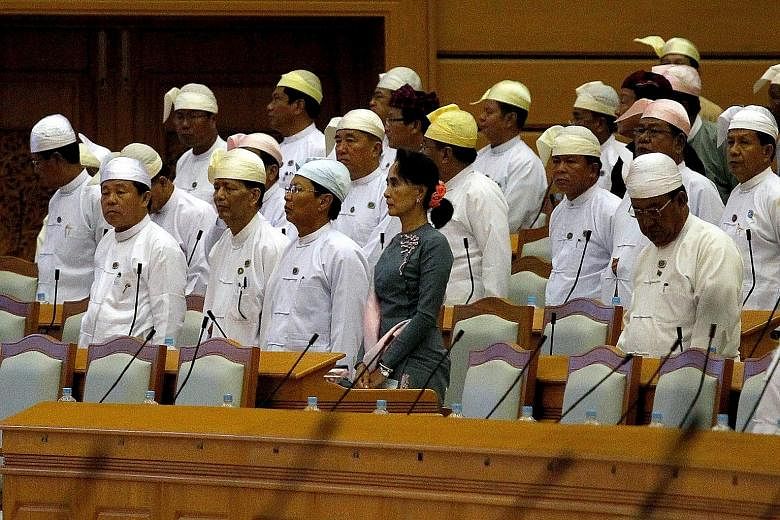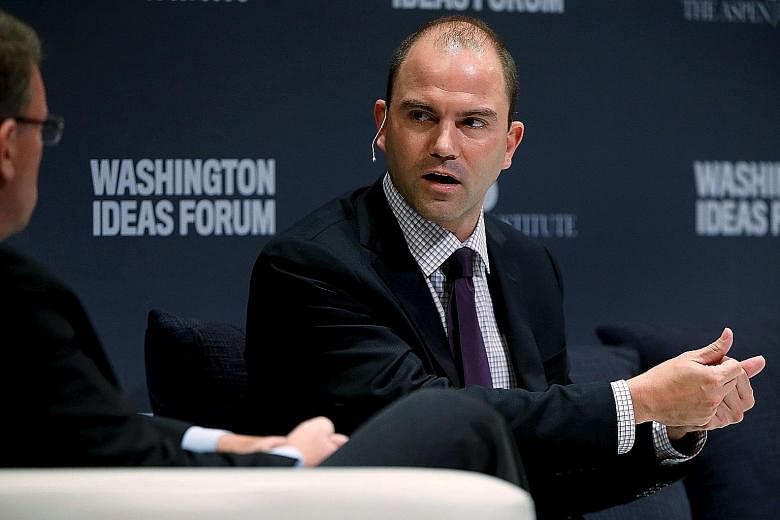Myanmar's neighbours will be dealing with a different form of government in a few months as Aung San Suu Kyi's party takes over running the country. But the change will not be radical, analysts and diplomats say.
After the National League for Democracy's (NLD's) landslide victory in the Nov 8 general election, Asia is cautiously awaiting the shape of the government to be formed at the end of next March.
Meantime, leading NLD figures have said Myanmar will be committed to neutrality, with ambitions of playing a stabilising role between its giant neighbours India and China.
If not headed by party leader Suu Kyi herself, a proxy president will be installed because The Lady, as she is referred to, is barred from the presidency under the military-era Constitution. But she has proclaimed that she will be the real power behind the appointed president. "She will certainly have her own mind," said a senior diplomat based in the region.
The NLD maintains that Myanmar, which has always seen itself as sandwiched between India and China, should revert to the neutrality of the post-independence era under its first prime minister U Nu, said party spokesman Nyan Win in an interview in Yangon last week.
In the interim, under the decades of military rule, its only real ally was China. But with a political transition in 2011, President Thein Sein's government, sensing the popular mood, distanced itself from the Chinese influence the former military regime had come to rely on. While most Chinese projects, including gas pipelines remained intact, the government unilaterally suspended the unpopular, China-backed Myitsone dam in Kachin state. Meanwhile, the transition towards free elections uncorked investment from Europe, the US and Japan, balancing China's prolonged domination in the country.
Myanmar has resumed balancing the influence of the big powers. "They have played China very well, placating them but also keeping them off balance," said the diplomat, who spoke with The Straits Times on condition of anonymity.
In the Yangon interview, Mr Nyan Win, a close confidant of Ms Suu Kyi, said: "We want to see Burma as a democratic country and internationally, equally share the duty of the international community."
In a separate interview, 93-year-old Tin Oo, co-founder and patron of the NLD, and a former army chief, said: "We have to become a stable country in South-east Asia. East Asia is also important. We have duties and responsibilities to work for peace, together with neighbours."
Among the congratulatory calls Ms Suu Kyi received after the NLD's election win were those from US President Barack Obama and Indian Prime Minister Narendra Modi. But none came from Myanmar's giant northern neighbour. China's foreign ministry spokesman merely said at a regular press briefing the day after the election: "As a friendly neighbour, the Chinese side supports Myanmar in pressing ahead with its political agenda in accordance with the law after the election so as to realise national stability and long-term growth."
Asian history professor Michael Aung-Thwin of the University of Hawaii said Beijing would proceed warily. "I think China would rather deal with Thein Sein and the present government than with Suu Kyi and a bunch of really inexperienced NLD folks who can be less practical and more morally righteous," he wrote in an e-mail.
There is no doubt, however, that Ms Suu Kyi, who visited China in June and met President Xi Jinping, will maintain a cordial relationship with Beijing. "Both the Chinese and Japanese have been very kind and patient during the past 20 years with (Myanmar) when everyone else especially the West was bashing the country," he wrote. "Asean, too, has been patient."
But some analysts believe that with the support Ms Suu Kyi will receive from the West, Asean may be a sideshow - especially given that the 10-nation group did not speak up for her during her years of detention at the hands of the previous military regime.
"Aung San Suu Kyi believes she plays on a bigger stage than Asean," Professor Michael Montesano, a senior visiting fellow at ISEAS in Singapore, said in an interview.
With India, the NLD leader has a warm personal history going back to her time spent in the country in her youth. In an interview with an Indian television channel last month, when asked about the relationship, she said: "I am always confident we will always be friends, good friends, who will be able to help one another."
Ms Suu Kyi also has a warm history with the United Kingdom. And in the United States, Myanmar's successful election is being framed as a major foreign policy success. Mrs Hillary Clinton, the Democratic Party's front-running presidential candidate, posted last weekend on her Facebook page: "Proud of my friend Aung San Suu Kyi."



